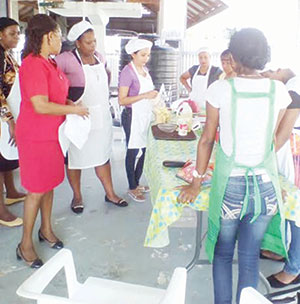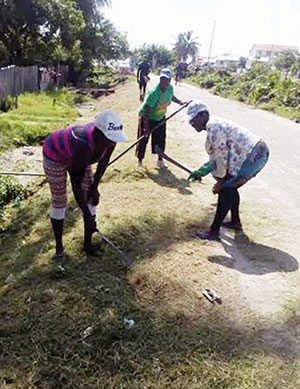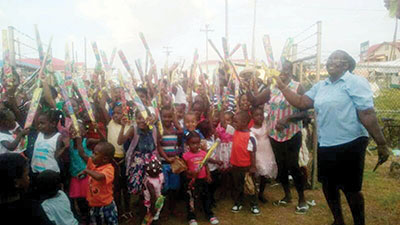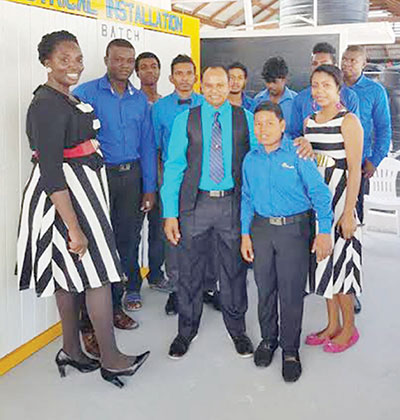– skills building courses part of intervention
By Ravena Gildharie
LOCAL investigators recently verified that a 29-year-old Policewoman of Lima, Essequibo Coast, had committed suicide with a single gun-shot wound to her throat. The incident sent shock waves countrywide, particularly in Essequibo, where several groups are aggressively  tackling suicide.
tackling suicide.
Collectively the groups, supported by government and private sector, offers counselling, training seminars and workshops, social community activities, public marches and skills training, all intended to reach out to depressed persons. There is the shared view that limited employment opportunities and lack of awareness lead a list of inter-connected social ills that effect suicide in the region, similarly as in other areas.
Daleep Singh, a well-known businessman and current President of the Essequibo Chamber of Commerce, once headed the Hindu-based Sanatan Dharm Per Upkaaric Sabha, which has been working since 1997 to address suicide in Essequibo.
The organisation, now led by Pandit Rameshar Jagarnauth, offers counselling at Mandirs in communities throughout the Coast. It has held seminars and workshops in several areas to create awareness and equip residents with knowledge on how to deal with depressed peers. It has also guided public marches.
Based on his experience over the years, Singh identified a main at-risk group from the age of adolescent to 25.
“I have noticed that when young people leave secondary school, there is sometimes a sense of hopelessness and it is a really tough time when they need guidance…at this age, just out of school, there is pressure on them to get jobs and this sometimes leads to depression,” Singh related.
Highlighting poverty, the businessman observed that in most suicide cases, victims come from poor homes and communities. This is often coupled with excessive alcohol drinking, use of illicit drugs, domestic violence, child abuse and peer pressure among others.
Help for Pomeroon and nearby communities
“Suicide is caused by depression which is linked to so many social ills and all of these are inter-connected…so we need to educate people and increase awareness in order to help depressed people, and identify potential suicide victims before it is too late,” Singh stressed.
He noted too focused on families of suicide victims as it has been common for surviving relatives to also become prone to depression and suicidal thoughts. Singh and his group worked with at least one family, who lost two members from the same home to suicide.
 At Jacklow in the Upper Pomeroon River, one family has been plagued by suicide on several instances. In the latest case, a mother of six, is still struggling to deal with the loss of her eldest adult son, who died early last year after ingesting a poisonous substance. The late farmer was the father of three small children, ages six to 12, who have now been left in the care of their grandmother.
At Jacklow in the Upper Pomeroon River, one family has been plagued by suicide on several instances. In the latest case, a mother of six, is still struggling to deal with the loss of her eldest adult son, who died early last year after ingesting a poisonous substance. The late farmer was the father of three small children, ages six to 12, who have now been left in the care of their grandmother.
“I sit every day and think about my son and just ask myself ‘Why? Why?’ My son was so happy and kind. I never know he would do something like that,” related the woman, who asked not to be named.
Prior to his death, the man’s reputed wife had attempted suicide thrice. She subsequently separated from her spouse, which reportedly led the man to take his own life. Just years before, his younger sister had attempted suicide, while previously, the family lost an uncle and an aunt in separate suicide cases.
This year, the Pomeroon is earmarked for attention by the Guyana Foundation, another non-governmental body functioning on the Essequibo. It operates a community-based Sunrise Centre at Zorg-En-Vlygt on the Coast but is moving to set up another at Charity before year-end.
“We have done needs assessments in Charity, Dartmouth and Bounty Hall and we saw a need to have a centre in Charity to cater for these areas and those in the Pomeroon. We are trying to get a location for the centre and we are open to support from anyone who would like to help us in this regard,” said Manager of the Essequibo Sunrise Centre, Miriam Hinds.
The Zorg-En-Vlygt facility was established last October and offers free counselling and skills-building programmes to attempted suicide victims and others. There is a senior counsellor on site along with Hinds, who is a trained counsellor and student pursuing advanced psychology studies. They see referrals too from the hospitals.
Hinds noted unemployment, family problems and poor self-esteem as some of the reasons people consider suicide.
“We have seen people with different problems and of all ages, even in their 60s…So far, the majority of persons we see coming to us are female, but it is widely known that men are more considered at-risk but often chose to keep their problems to themseleves,” Hinds pointed out.
The Sunrise Centre opens Monday to Saturday and conducts free courses in tailoring and dressmaking, cosmetology, catering and computer repairs and programming.
“We have been making quite an impact since we launched here…there has never been this kind of facility before on the Essequibo Coast, where people have an opportunity to come out in an open and friendly atmosphere to talk and relieve the burdens on their minds. We have a welcoming staff and there are participants who say their lives have changed, and they now have hope as a result of the work we do,” the counsellor indicated.
Women tackling suicide
Situated closer to the town of Anna Regina, another group, Women of Substance Making a Difference, has also been tackling suicide and abuse by conducting activities to promote community development and push youth and women empowerment. The group established in October 2015 currently comprises about 22 women and is based at Henrietta. It’s President, Adele Jonas, offers one-on-one counselling to young people, and feels her efforts are paying off as she helped to prevent at least three persons from attempting suicide.
“In one case, I even found the bottle of poison in the person’s bag when they met with me,” Jonas recalled.
The women have been active too in organising various community events that attracts the involvement of men and young people such as clean-up campaigns, luncheons, feeding programmes and skills building workshops. While they involve various nearby communities, the women have focused much of their work in depressed areas such as the Lima Sands and Red Village.
Last Easter, the group staged a massive kite distribution and feeding exercise for kids in these communities. They previously held a floral workshop conducted by three trained professionals and attracted some 43 students.
For Mother’s Day, they kept a day sale and attracted a number of young people who were eager to participate.
“While it is difficult to get the young people to join our group as full-time members, we try to hold activities and events that would accommodate them and keep them involved, and out of trouble,” Jonas stated.





.jpg)








